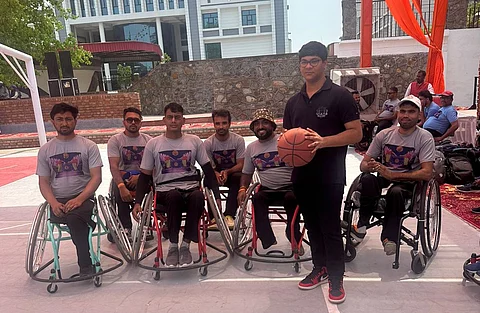

I’ve always loved basketball. But growing up, I noticed that while I had the freedom to run, shoot, and play, others, particularly wheelchair-bound athletes, faced far too many barriers. I couldn’t ignore the inequality, and so I decided to do something about it.
In August 2023, I founded Hope on Wheels, a multi-pronged social initiative built around one simple but powerful idea: that everyone deserves a fair shot at sports, no matter their physical limitations. Working closely with the Wheelchair Basketball Federation of India (WBFI), I’ve tried to turn this belief into action.
Through Hope on Wheels, I helped organise and lead national wheelchair basketball coaching camps for the Indian Women’s National Team, both in urban cities and rural areas. I assisted athletes with logistics, facilitated team strategy sessions, and connected with local communities to broaden participation. Being on court with these athletes—watching them push through adversity with strength and spirit—has been one of the most inspiring experiences of my life.
But accessibility is also about resources. That’s why I’ve worked hard to raise over Rs 11 lakh (approximately USD 13,000) from corporate sponsors to support the 7th and 8th National Wheelchair Basketball Championships. These funds didn’t just pay for tournaments; they also bought life-changing assistive devices — wheelchairs, crutches, and hearing aids — for dozens of para-athletes across the country.
I’ve also tried to spread awareness beyond the court. My Spreading Hope children’s book series features stories like Bharat Bounces Back and Tara’s Topspin — tales that help young readers see disability not as a limitation but as a part of life that deserves celebration and support. These books have been donated to schools nationwide to build empathy from an early age.
And as someone interested in engineering, I developed WheelTrack, a wearable device that collects biometric and motion data to help wheelchair athletes train smarter and avoid injury. It’s now being used by WBFI athletes at the national level, and I’ve presented it internationally. The device is currently patent-pending in India.
The journey is far from over, but each story I hear, every athlete I meet, and every barrier we break together makes the path worth it. Inclusion is not a privilege — it’s a right. And through Hope on Wheels, I hope to keep driving that message forward — one basket, one wheelchair, and one hopeful voice at a time.
Books by Kavish:
(Kavish Agarwal is a Grade 11 at Step-by-Step School, Noida. Views expressed are his own.)
